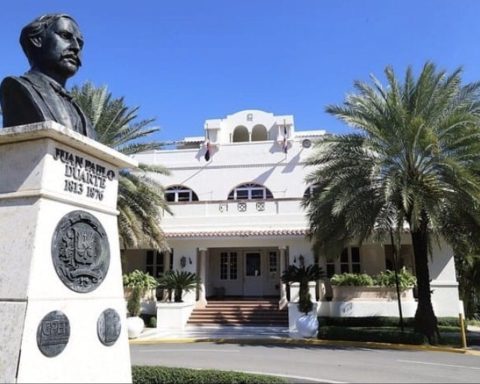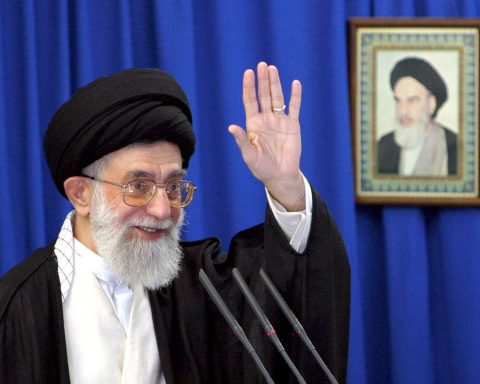As a friend told me, some people believed that my criticism of the left at the time came from the fact that I did not know it. The strength of my convictions was due, on the contrary, to the fact that it came, albeit partially, from her. In my university years he was a supporter of the Fragua group, an active Marxist militant. I remember the motto of the organization, “thought and action merged in arms against injustice.”
We believed we were designated for a great mission, which for obligatory reasons began in the UASD. What none of us realized was that this mission ended right there. We believed in the need to cleanse the world of the burdens of an ominous past, which stubbornly persisted around us. At the university, the reaction was represented by the old and wise professors who resisted, with their presence in the classrooms, the dizzying pace of the new winds that were blowing.
It was a time of reform and I remember well that this was the name of the movement that tried to adapt the university to the new times. But things happened that made me change my mind. The first thing was the slogans, which the comrades around me repeated like machines, devoid of feeling and intelligence. Then, the conduct of many of those representatives of the vanguard, revolutionaries, who hardly attended classes and whose capacity was very far from resembling that of those old and retarded aristocrats who had been forced to go home, but not before passing them off as an act of humiliation.
The difference was that those representatives of the reaction who had been removed methodically kept their schedules and assisted the students long after their duties on campus had concluded, answering phone calls to their homes and offices from any of their students. Many of the substitutes bragged about their revolutionary behavior. They praised the winds of reform and proclaimed the inexorable need, like the march of time, for a social change to impose justice, which with their long absences from the classroom they probably contributed to postponing. We had supposedly taken a step forward in the construction of a new society. Although the dedication of the representatives of the new university order tended to confuse us.
The situation invited me to think. And with this effort I really discovered what was the path that my conscience indicated to me. So my criticisms had a solid knowledge base.
–0—
At the end of April 1985, the evening newspaper Ultima Hora published a letter of thanks for an editorial that censured the frequency and violence of riots on the grounds of the state university. On that same date, I received a similar letter.
The letters and the comments that originated them had something in common. Both the newspaper and I had warned of the danger faced by the residents of the university campus; the next thing to a tragedy that the manifestations of university violence placed the residents of the place. But neither the letter to the newspaper nor the one that was sent to me had responsible signatures. At the bottom of the letter appeared only the name of a ghost organization: “Comité de Vecinos de la UASD”. On the occasion of the 20th anniversary of the April Revolution of 1965, thousands of words were written that month and marathon speeches were delivered to exalt the event as a patriotic feat. All the literary efforts were placed at the service of the cause that intends to see in this Dominican historical episode only the confrontation of two forces, those of good and the revolution on the one hand, and those of evil and regressionism on the other.
Within this conception, a strange distinction has been made between the victims, exalting those on one side as martyrs of freedom and democracy and reviling those on the other as victims of their own ambition and the wrath of a just God. that has taken ideological militancy among men.
Faced with such an absurd distortion of the facts, I wrote two articles demanding equal treatment for all the dead. He demanded respect for others. He said that the pain of a mother from San Isidro was identical to that of a constitutionalist mother and that many heroes of the Revolution were there by chance, for various reasons, some as curious as those who joined her for the simple fact of meet on one side of the city when the cry of the crowd shook the streets of Santo Domingo. As a result of those articles, a voice that identified itself as “a father from San Isidro” called me. He had gotten the phone number from the newspaper. The reason for the call was to express his gratitude to me; “My son was doing his duty when they killed him,” he told me, with an audible lump in his throat.
His call touched me. But when I suggested that she go public with her feelings and write a letter to the newspaper, she evaded me. Then I confirmed what I had always feared and that is that most of the inaccuracies, errors in judgment and ideological schemes that distort recent Dominican history are caused by the fear of those who are affected by the same situation to enter the debate. Even those who had lost a child, and therefore had nothing else to lose, were filled with fear and shame.
–0—
There is a fundamental difference between a revolutionary position and attitude. In our country there are many leaders willing to assume the former, which as a general rule brings them its advantages. What does not seem easy is finding people willing to support the latter.
The revolutionary positions have a lot to do with what a leader or a militant maintains in terms of ideology. Revolutionary attitudes with what a person is in his daily life. A revolutionary stance is not assumed by simply embracing Marxism. Revolutionary conduct is achieved after a long life of selflessness and service to the community. For this reason I have seen an infinite number of reactionary Marxists and a good number of revolutionary businessmen. It will always be more difficult to maintain a revolutionary behavior than a position in favor of an effective social change.
Mainly because most of those who claim a revolutionary record here live and act in constant conflict with their political preaching. Thus one can see corrupt politicians, enriched at the expense of the State and the productive work of others, vociferating at rallies and pontificating on radio and television programs about the need to change the relations of production and do this and that to transform conditions. of the dispossessed masses, and then return to their luxurious mansions to drown their protest chants in whiskey.
Any simple work of philanthropy is ultimately more humanitarian than any proposal for social change formulated by one of those opportunistic leaders who live here constantly giving in to the temptation of vice and wealth and perpetuating their .validity. based on pronouncements against the system, from which they are abundantly nourished. Dominicans will not be better or more revolutionary just because we adopt a political philosophy or an ideological dogma. Systems do not change men, nor do they modify human nature.
There are good revolutionaries as well as bad and very bad ones. And the same is true under other political systems. The important thing, therefore, is not that our political, business and social leaders are Marxists or “men of advanced ideas”, as they say. The important thing is that they are capable men and women, aware of their elementary responsibilities and endowed with fine social sensitivity. The sense of duty is the first step towards an effectively revolutionary conduct. I know a large number of conservatives and traditionalists with a finely developed perception of that duty, and a larger number of “avant-garde ideas” totally and utterly devoid of it.
Furthermore, everyone knows how many revolutionaries live in this country and how they treat the poor and the subordinates.
–0—
The fact is that, in practice, nothing differentiates one extreme from the other in terms of ideology. In essence and methods, the communists hardly differ from the fascists. They have many things in common. They agree on basic issues and at crucial moments in history, their alliances, devoid of any moral justification, led to war and the Holocaust. The famous secret agreement between the German foreign ministers, Von Ribbentrop, and the Soviet, Molotov (died at 96), signed in Moscow in 1939, precipitated the Nazi attack on Poland that began World War II. The Russian pretext has been that this pact protected the USSR from a German invasion. The truth is that the agreement included other points that at that time calmed the desire for imperial dominance of both the Hitler regime, in Berlin, and that of Stalin, in Moscow. While the SS and Wermatch troops crossed the Polish border lines, in the first blitzkrieg test, the Russian armies did the same towards Finland.
This surprise attack lacked any patriotic or ideological foundation. It was based exclusively on the Stalinist claim to annex the territory of Finnish Karelia.
The Soviet hierarchs believed this an easy undertaking. For some time the infiltration and political work had stirred up the waters in the invaded territory and the communists believed that the conditions were given for an incorporation without major problems. There was also the overwhelming superiority of the Soviet military machine over the small and ill-equipped Finnish army. But the ease with which the Germans took Poland was not replicated in Finland, where the Red Army suffered many humiliations and shameful defeats before consummating the military and political operation in Finnish Karelia. World War II provided the world with several clear and compelling demonstrations of the scope of Marxist morality and the ruthless nature of the Soviet regime.
The secret agreement with Germany, which allowed Hitler to attempt to carry out his designs for European domination, was not the only Soviet example of collusion with fascists.
When the Warsaw Jews handed over the last of their men at the gates of the ghetto and the German resistance to the thrust of the Russian advance became untenable, Marshal Shukov’s troops positioned themselves opposite the Vistula, in the vicinity of Warsaw, to wait for the destruction of the last vestige of the Polish army. Stalin and the other leaders of the Soviet Communist Party feared the fiery nationalism of the Polish officers. They understood that the preservation of that force would hinder Russian plans for domination of postwar Poland. The inactivity of Shukov’s army while the Germans massacred the Poles and Jews, being able to prevent it with almost minimal effort, gives an idea of what the communists mean when they proclaim that “the end justifies the means.” The subsequent slaughter of Polish officers , whose corpses were later found in the forests of Katyn, a Polish village west of Smolensko, and attributed to the Soviets based on testimonial evidence, was nothing more than the epilogue of that expansionist design of the old imperial dream of the tsars that Bolshevism preserved and fulfilled for several decades for the “glory of mother Russia”.
On the level of theory, the divergences between the communists and the fascists could be enormous. But in practice nothing distinguishes them when it comes to achieving their political goals. Basically they pursue the same thing. Nothing fundamental differentiates, in effect, fascist authoritarianism from Marxist-Leninist totalitarianism.
History is full of examples that show that moral principles and reservations have never been insurmountable obstacles for them. In Cuba, for example, the Communist Party considered Fidel Castro and his people on July 26 as “petty bourgeois adventurers” until the very eve of the triumph of the revolution. And many of its leaders were ministers and collaborators of Batista, the corrupt dictator who, in his own definition, subjected the island to imperialist domination.
The entrance Chapter 13 – The clash of ideologies was first published on elCaribe newspaper.
















